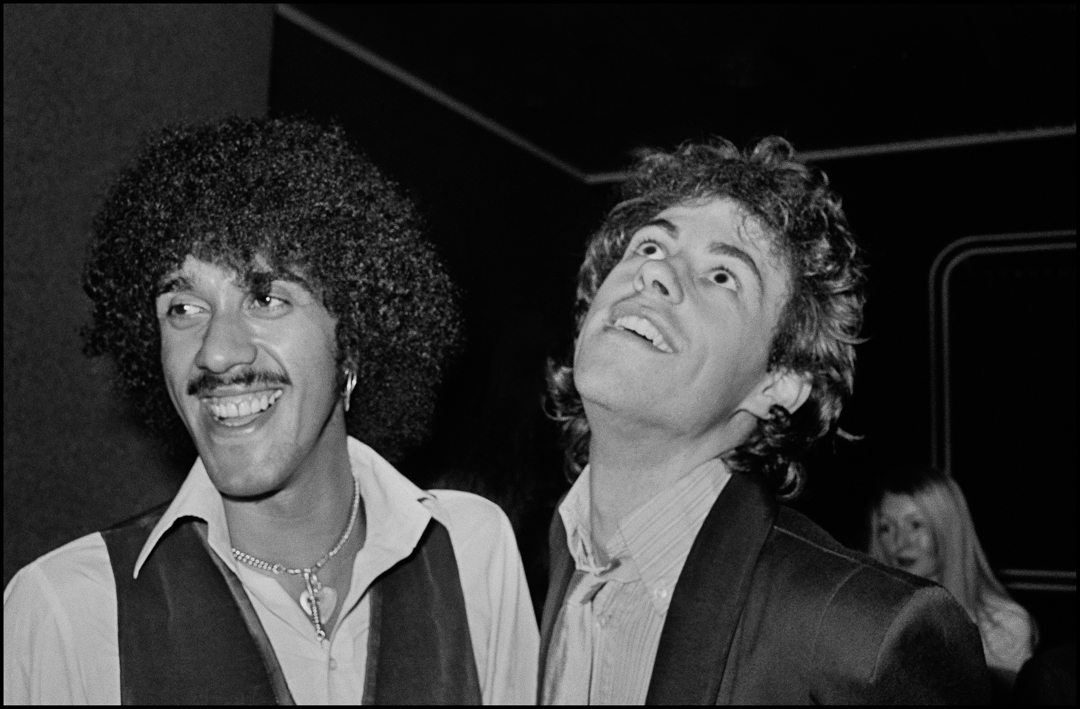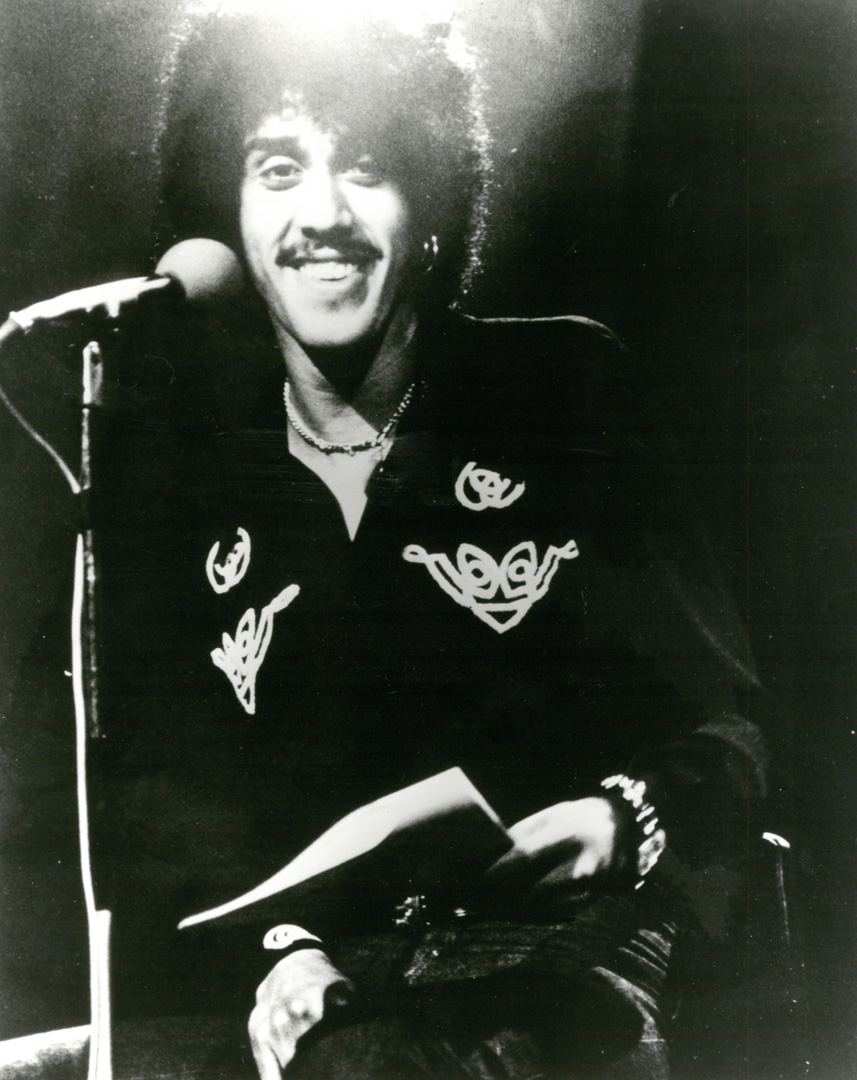- Music
- 04 Jan 24

On January 4, 1986, Thin Lizzy icon Philip Lynott died, aged 36. To mark his anniversary, we're revisiting the late Bill Graham's reflections on Lynott's tragic death, and the funeral and tributes that followed
Philip Lynott: An Epitaph
Originally published in Hot Press in January, 1986
His last date was standing room only. As three priests celebrated Philip Lynott's funeral Mass, Howth's Church of the Assumption, where he regularly brought his daughters Sara and Cathleen for Sunday Mass, was jammed by mourners numbed by the knowledge that there could be no more "Knowwarrimean!"
And later, when he was buried in St.Fintan's cemetery, close to the Sutton shoreline, on this bright but bitingly blustery day, as many as 300 cars parked along the sides of the road slanting up to the Hill of Howth.
The stars were there, of course: Bob Geldof and Bono and Larry Mullen, whose groups had supported Thin Lizzy at Irish festivals and benefited from Philip Lynott's canny advice and ever-available encouragement, as well as others like Paul Brady and Maire Ni Bhraonain, Charles Haughey and his daughter, Eimear slipped quietly and self effacingly into a stall.
Advertisement

Philip Lynott and Bob Geldof
Yet perhaps Charles Mallen in the Sunday Independent had the best line when he wrote of 'the famous, the fans and the fishermen', for the tributes of those others - the vast majority in the church, the unmentioned non-celebrities, the quietly grieving fans and those who'd known him, around Howth - should not be forgotten either.
It is not a time to pry into the sorrow of his family. What I most recall is the visible distress of his earliest Dublin friends, colleagues, and contemporaries. You could see the pain etched on the faces of such as Brian Downey, photographer Tom Collins and those like publicist Terry O'Neill and Pogues manager Frank Murray, who'd worked with Phil from the beginning. Unable to approach the graveside throng, Brush Shiels mourned on the outskirts of the crowd. A week after the event, the death was still hitting many hard.
There were others like Ted Carroll, Lizzy's first manager, who later became the prototype for 'The Rocker' when he opened the Soho golden oldies "Rock On" stall and ex-Strangelys Tim Booth and Ivan Pawle, whose flat, actually named Orphanage, had been a crash pad for Phil in his earliest days. For one generation, there were still many golden memories left but also, not far beneath the surface, the sense that we shouldn't be meeting like this.
Then there were his international colleagues like Scott Gorham and John Sykes and wreaths from such as Rory Gallagher, Mama's Boys, Dire Straits and close friend Huey Lewis, whose own band Clover once supported Lizzy. But this was as lengthy a guest list as Lizzy ever had; mentioning everyone would be a near-endless litany. They knew who they were and why they were there.
Throughout, the music was Irish. In the first and personally most poignant moment, with the assistance of Dubliner Barney McKenna, also a Howth resident, local folk group Clann Eadair opened the Mass with the instrumental 'Tribute to Sandy Denny', the almost Elizabethan lament Phil Lynott had recorded with them.
Advertisement
Later they played 'Song for Ireland' and at the graveside, the group's piper Leo Rickard wafted out a slow air from 'The Brendan Voyage', expressing the hope that Phil Lynott may now have entered Hy Brassil, closer to heaven than most of us will ever be.
And in the church, his father in law Leslie Crowther read a passage from the New Testament, Romans 14 : "You should never pass judgement on a brother or treat him with contempt as some of you have done".
And therein laid the pain. His death caused an undeniable shock, a sense of something misplaced, of what might have been. But he was as humanly fallible as any, a softer man with his own share of self-doubt, more sensitive and complex than he oft revealed in public.
People will say that Philip Lynott was a victim of his own success, and is as true or false as any cliche, but they would be wrong to solely concentrate on the tales of excess and forget that he was and should be honoured as more than the leader of Thin Lizzy. If he never fought his way out of the ever tightening Lizzy strait-jacket, he should never be ranked with mere HM hacks. With all the styles and influences that could feed his songwriting, it is no exaggeration of his talent to say he could now be operation in the same neighbourhood as Prince.
When Lizzy returned to play Dalymount in '77, headlining above Bob Geldof's fast rising Rats, Phil Lynott was deservedly King of the City. Since then I've handsome prickly memories but also the good. Last year, one spring lunchtime, I remember walking with him down Sean McDermott Street and seeing him greeted at every door. Last Saturday, people mourned because they knew they had been touched by the good soul in him and because they also knew Philip Lynott was his own brand of loyalist: once a Dub, always a Dub.
If a man can say he kept the affections of his friends; it is a worthy epitaph.
Advertisement
 Phil Lynott.
Phil Lynott.Browse Hot Press's Philip Lynott Collection here.
The Dedication: Remembering Phil Lynott continues this evening, January 4, at the Button Factory in Dublin, hosted by Roddie Cleere.










